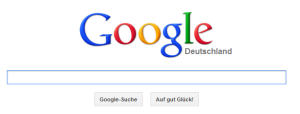German Court Says Google Must Block Libelous Words Added Via Autocomplete Function
In a surprising turn of events, Germany’s top civil court overturned two lower court rulings on a case involving Google’s autocomplete function. According to the ruling, it is Google’s responsibility to block libelous words that appear next to a name via the autocomplete function if Google has been alerted to the defamatory words. The plaintiff […]

The plaintiff in the case was an unidentified nutritional supplements company that filed the lawsuit against Google because the German-language site’s autocomplete function was adding the terms “Scientology” and “fraud” to the company’s name in search queries. The Washington Post reports that ruling by the Federal Court of Justice in Karlsruhe states the search suggestions offered by the autocomplete feature are a form of defamation as they falsely imply, “…a factual link between the plaintiff and the terms ‘Scientology’ and/or ‘fraud,’ which have negative connotations.”
In a case that is still pending, Germany’s former first lady Bettina Wulff brought similar charges against Google last year. When searching on the name Bettina Wulff, Google’s autocomplete function suggested words related to Germany’s red light district and escort services.
Because Google’s autocomplete function uses an algorithm that relies on the frequency of previously searched terms, Bloomberg.com claimed the German spokesman for Google was surprised and disappointed by the ruling, finding it “incomprehensible” that Google could be held accountable for search terms entered by users. The Karlsruhe court argued that, “The search additions affect the plaintiff’s privacy rights as they convey the statement that there is a relationship between the plaintiff and the negative words. If that statement was untrue, the plaintiff’s rights would be violated.”
Opinions expressed in this article are those of the guest author and not necessarily Search Engine Land. Staff authors are listed here.
Related stories
